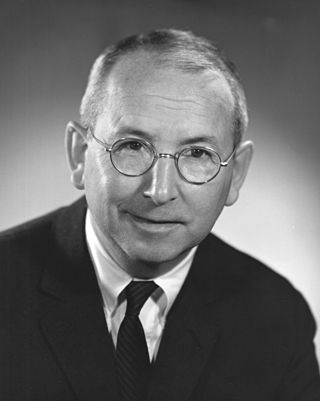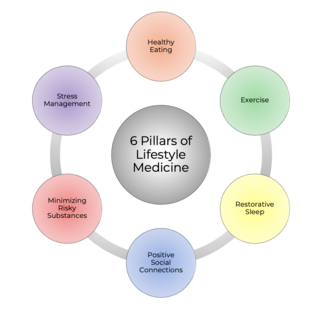
Paul Donald MacLean was an American physician and neuroscientist who made significant contributions in the fields of physiology, psychiatry, and brain research through his work at Yale Medical School and the National Institute of Mental Health. MacLean's evolutionary triune brain theory proposed that the human brain was in reality three brains in one: the reptilian complex, the limbic system, and the neocortex.
The Journal of the Royal Society of Medicine is a peer-reviewed medical journal. It is the flagship journal of the Royal Society of Medicine with full editorial independence. Its continuous publication history dates back to 1809. Since July 2005 the editor-in-chief is Kamran Abbasi, who succeeded Robin Fox who was editor for almost 10 years.

Lifestyle medicine (LM) is a branch of medicine focused on preventive healthcare and self-care dealing with prevention, research, education, and treatment of disorders caused by lifestyle factors and preventable causes of death such as nutrition, physical inactivity, chronic stress, and self-destructive behaviors including the consumption of tobacco products and drug or alcohol abuse. The goal of LM is to improve individuals' health and wellbeing by applying the 6 pillars of lifestyle medicine (nutrition, regular physical activity, restorative sleep, stress management, avoidance of risky substances, and positive social connection) to prevent chronic conditions such as cardiovascular diseases, diabetes, metabolic syndrome and obesity.

A subpersonality is, in humanistic psychology, transpersonal psychology and ego psychology, a personality mode that activates to allow a person to cope with certain types of psychosocial situations. Similar to a complex, the mode may include thoughts, feelings, actions, physiology and other elements of human behavior to self-present a particular mode that works to negate particular psychosocial situations. American transpersonal philosopher Ken Wilber and English humanistic psychologist John Rowan suggested that the average person has about a dozen subpersonalities.

Susan Margaret Love was an American surgeon, a prominent advocate of preventive breast cancer research, and author. She was regarded as one of the most respected women's health specialists in the United States. Love is best known for pioneering work fueled by her criticism of the medical establishment's paternalistic treatment of women. She was an early advocate of cancer surgery that conserves as much breast tissue as possible. She also was among the first to sound the alarm on the risks of routine hormone replacement therapy (HRT) for menopausal women.
Sachin H. Jain is an American physician who held leadership positions in the Center for Medicare and Medicaid Services (CMS) and the Office of the National Coordinator for Health Information Technology (ONC). From 2015 to 2020, he served as president and chief executive officer of the CareMore Health System. In June 2020, it was announced that he would join the SCAN Group and Health Plan as its new president and CEO. He is also adjunct professor of medicine at the Stanford University School of Medicine and a Contributor at Forbes. In 2018, he was named one of American healthcare's most 100 most influential leaders by Modern Healthcare magazine (#36).
Claudia S. Miller, an allergist and immunologist, is an author, instructor, and scientist noted for research in chemical intolerance, and development of tools for its diagnosis. Miller is a professor of occupational and environmental medicine in the School of Medicine at the University of Texas Health Science Center at San Antonio. She also is assistant dean for the school's M.D.-M.P.H. program, and vice chair of community medicine in the school's Department of Family and Community Medicine.

Michael H. Cohen is an American attorney. He is the founder of the Cohen Healthcare Law Group, and a former professor at Harvard Medical School and the Harvard School of Public Health. Cohen has authored books on health-care law and policy.
Rozalyn (Roz) Anderson is a professor at the University of Wisconsin School of Medicine and Public Health. She studies aging and caloric restriction in primates.
Obesity medicine is a field of medicine dedicated to the comprehensive treatment of patients with obesity. Obesity medicine takes into account the multi-factorial etiology of obesity in which behavior, development, environment, epigenetic, genetic, nutrition, physiology, and psychosocial contributors all play a role. As time progresses, we become more knowledgeable about the complexity of obesity, and we have ascertained that there is a certain skill set and knowledge base that is required to treat this patient population. Clinicians in the field should understand how a myriad of factors contribute to obesity including: gut microbiota diversity, regulation of food intake and energy balance through enteroendocrine and neuroregulation, and adipokine physiology. Obesity medicine physicians should be skilled in identifying factors which have contributed to obesity and know how to employ methods to treat obesity. No two people with obesity are alike, and it is important to approach each patient as an individual to determine which factors contributed to their obesity in order to effectively treat each patient. Physicians specializing in obesity medicine may choose to obtain board certification by the American Board of Obesity Medicine.
Joan Y. Reede is an American physician. She is Harvard Medical School's inaugural dean for diversity and community partnership in the Office of Diversity, Inclusion, and Community Partnership. She is also a member of the National Academy of Medicine. She is known for creating programs that mentor and support minority physicians and female physicians. Alumni of her programs have created a 501(c)(3) organization called The Reede Scholars in her honor.
Elizabeth Howe Bradley is the eleventh President of Vassar College, a role she assumed on July 1, 2017. Bradley also holds a joint appointment as Professor of Political Science and Professor of Science, Technology, and Society.
Neil R. Powe is an American professor of medicine at the University of California, San Francisco and the chief of medicine at the Zuckerberg San Francisco General Hospital and Trauma Center. Previously he was professor of medicine at the Johns Hopkins University School of Medicine. His research has mainly related to kidney disease, cardiovascular disease and health disparities.
Jerome Sarris is Co-CEO of Psychae Therapeutics and Co-Director of the associated Not-For-Profit Psychae Institute. He was appointed Professor of Psychedelic Medicine at The Centre of Mental Health at Swinburne University of Technology He also holds Adjunct roles at NICM Health Research Institute at Western Sydney University, Australia, and at the Florey Institute of Neuroscience and Mental Health at the University of Melbourne, Australia.
Catherine Lord is an American psychologist and researcher. She currently serves as a member of the International Advisory Board for The Lancet Psychiatry, as co-chair of the Scientific Research Council of the Child Mind Institute, and as the George Tarjan Distinguished Professor of Psychiatry and Education at the Semel Institute for Neuroscience and Human Behavior at UCLA.

Camara Phyllis Jones is an American physician, epidemiologist, and anti-racism activist who specializes in the effects of racism and social inequalities on health. She is known for her work in defining institutional racism, personally mediated racism, and internalized racism in the context of modern U.S. race relations. During the COVID-19 pandemic, Jones drew attention to why racism and not race is a risk factor and called for actions to address structural racism.
Staci Ann Gruber is an Associate Professor of Psychiatry at Harvard Medical School and Director of the Cognitive and Clinical Neuroimaging Core (CCNC) and the Marijuana Investigation for Neuroscientific Discovery (MIND) Program. She is known for her work examining substance use and psychiatric conditions using advanced neuroimaging techniques and measures of cognitive performance.

Fatima Cody Stanford is an American obesity medicine physician, internist, and pediatrician and an associate professor of medicine and pediatrics at Harvard Medical School. She is one of the most highly cited scientists in the field of obesity. She is recognized for shifting the global perception of obesity as a chronic disease.
Michael Fredericson is an American academic and physician. He currently serves as a professor of orthopedic surgery and the director of Physical Medicine and Rehabilitation (PM&R) Sports Medicine within the Department of Orthopaedic Surgery at Stanford University. He is also the co-director of the Stanford Longevity Center.
Stjepan Orešković is a professor at the University of Zagreb School of Medicine and former director of the Andrija Štampar School of Public Health.







